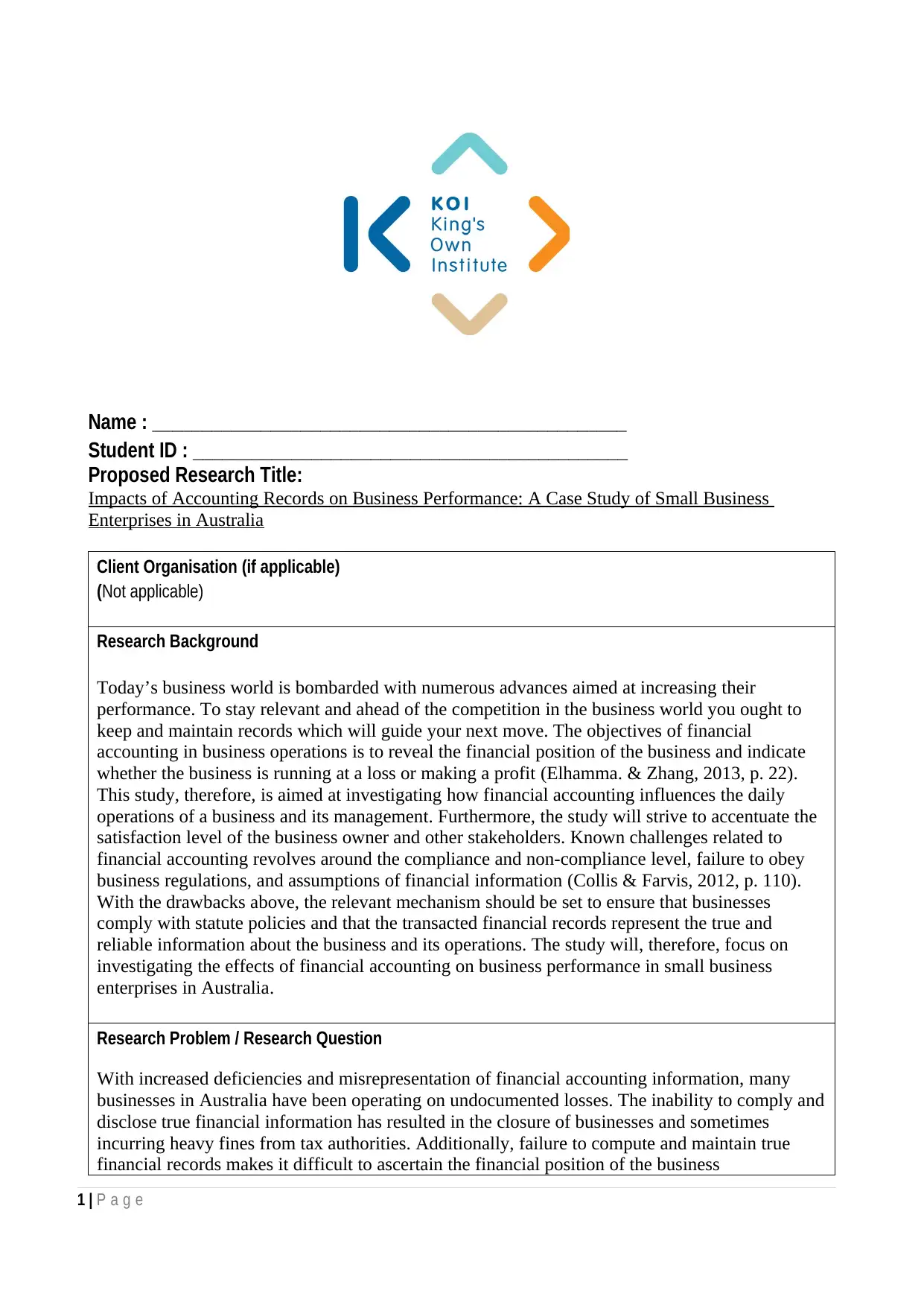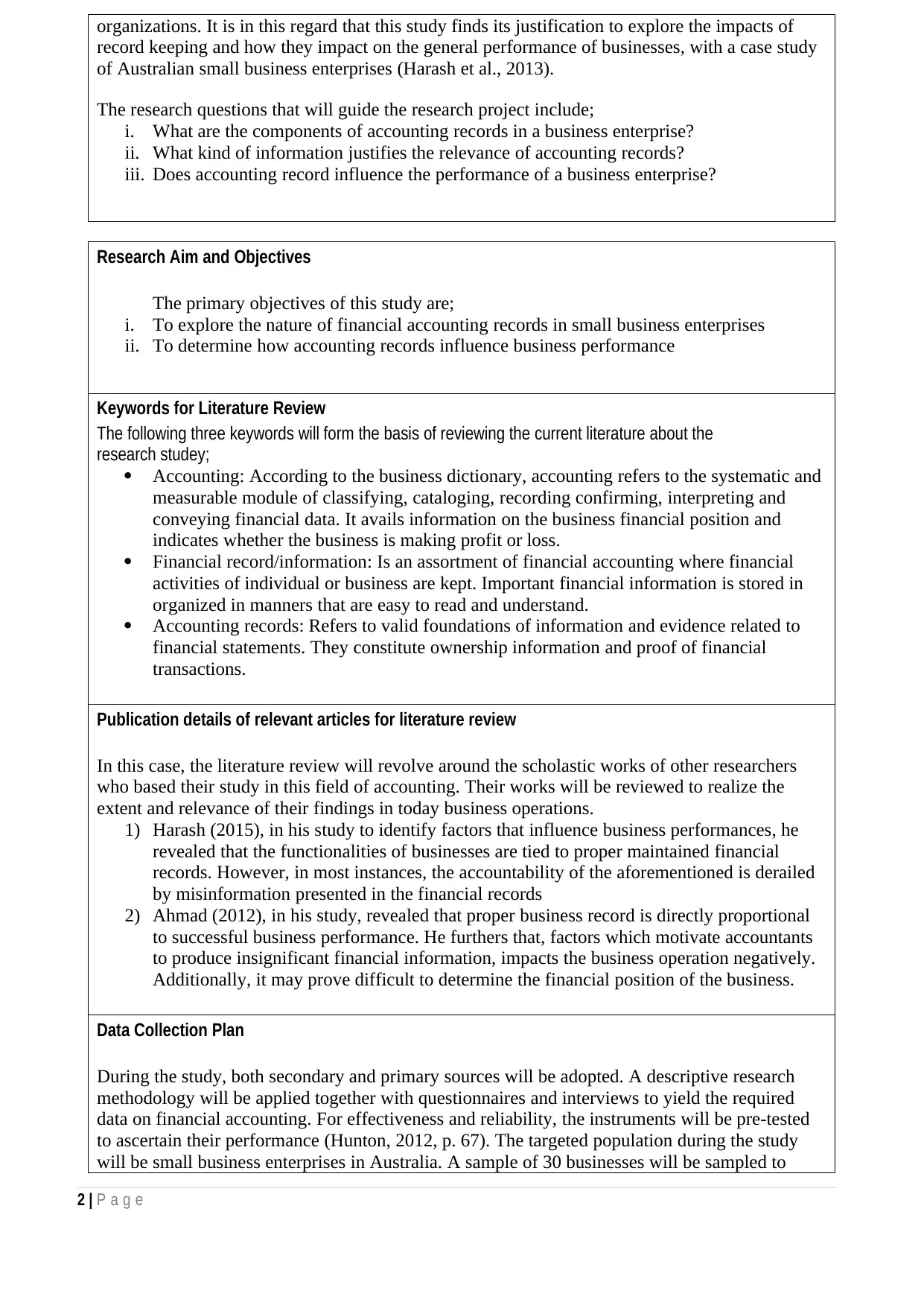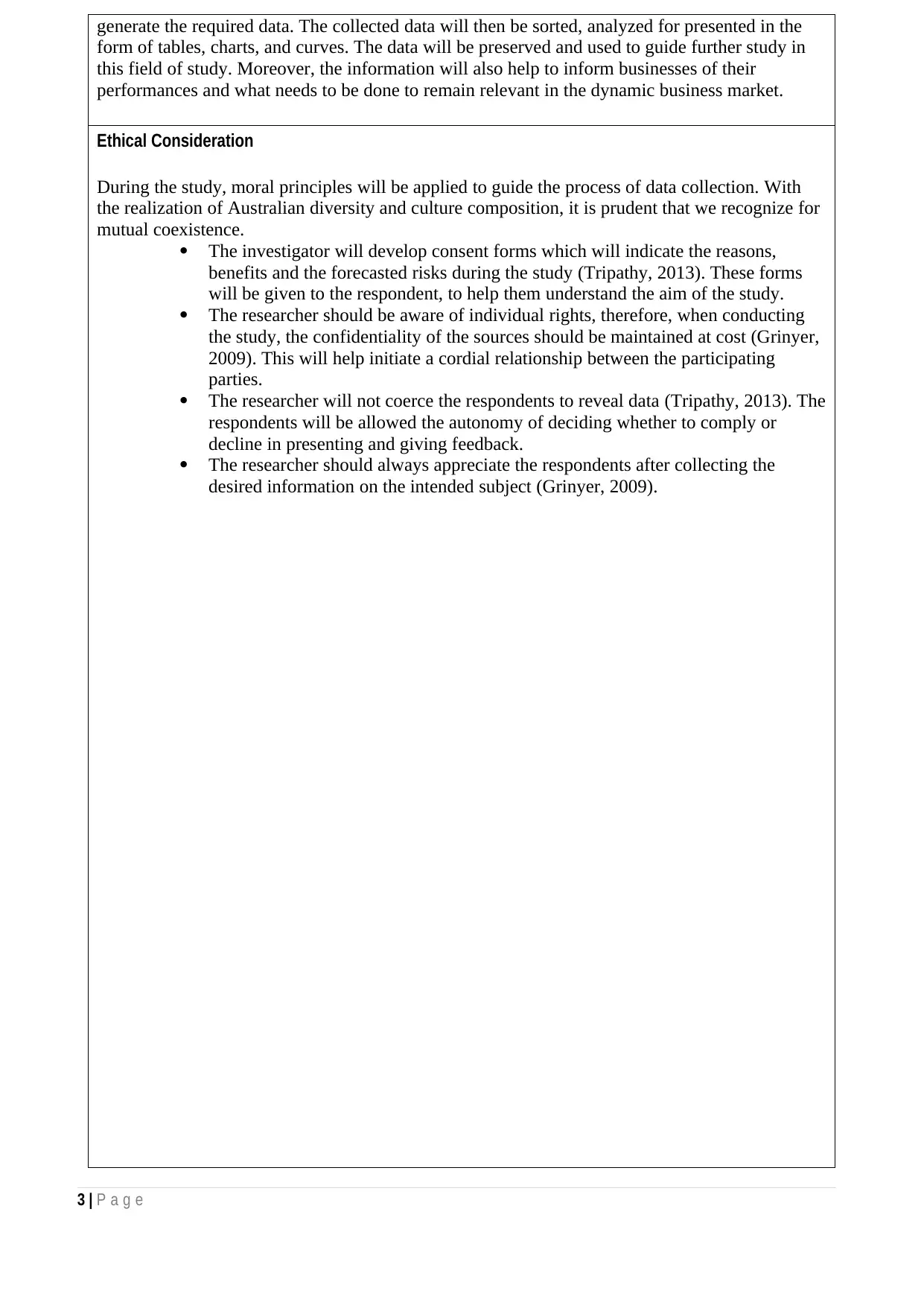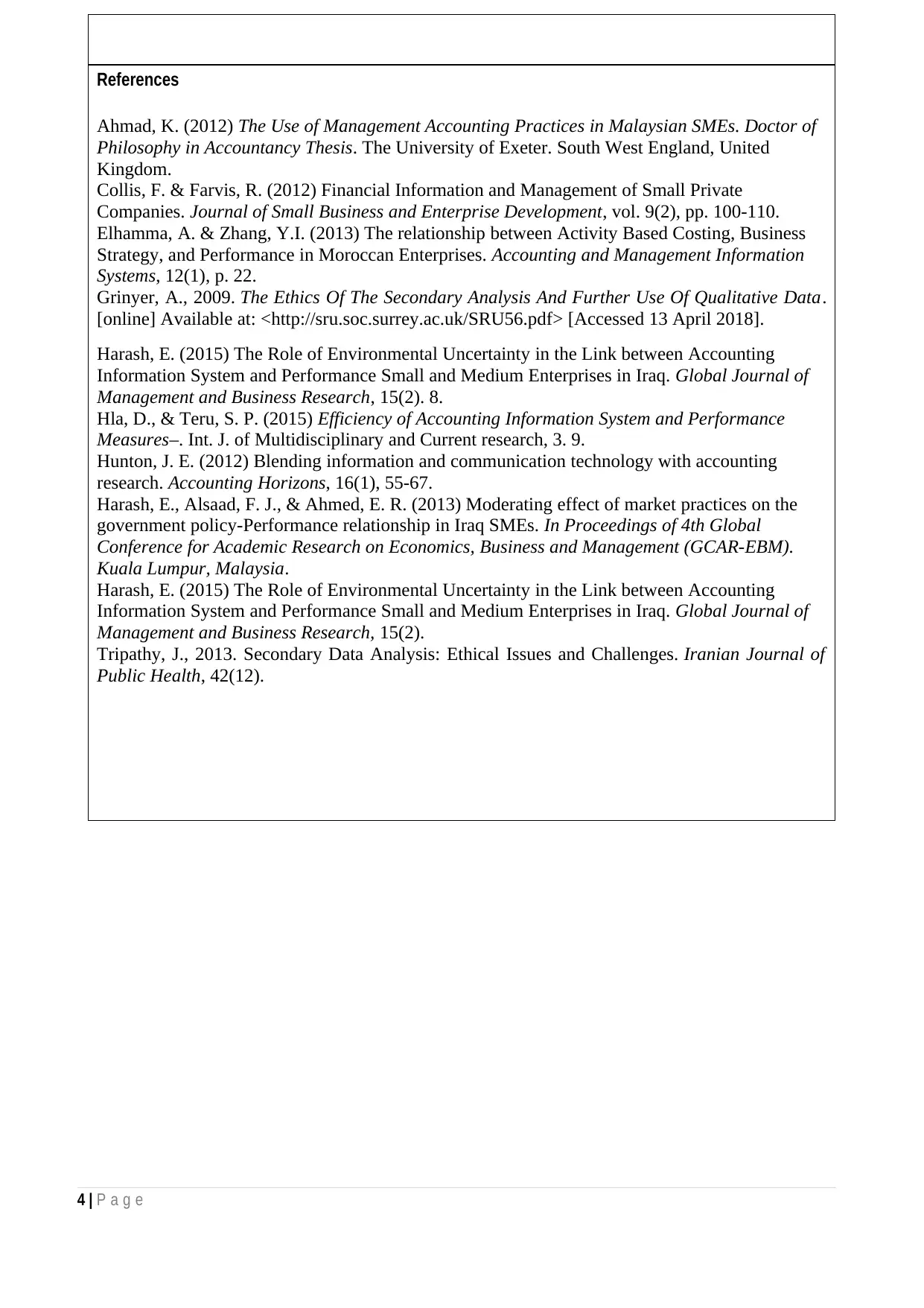BUS707: Accounting Records Impact on Australian Small Businesses
VerifiedAdded on 2023/06/13
|4
|1498
|221
Project
AI Summary
This project investigates the impacts of accounting records on business performance, focusing on small business enterprises in Australia. It addresses the research problem of increased deficiencies and misrepresentation of financial accounting information leading to business losses and non-compliance. The research aims to explore the nature of financial accounting records in SMEs and determine their influence on business performance. The study employs both secondary and primary data collection methods, including questionnaires and interviews with a sample of 30 businesses. Ethical considerations, such as informed consent and confidentiality, are emphasized throughout the research process. The findings intend to inform businesses about their performance and guide future research in this field, with a focus on the role of accounting records in maintaining relevance in the dynamic business market. This project was created by a student and is available on Desklib, where students can find past papers and solved assignments.

Name : ________________________________________________
Student ID : ____________________________________________
Proposed Research Title:
Impacts of Accounting Records on Business Performance: A Case Study of Small Business
Enterprises in Australia
Client Organisation (if applicable)
(Not applicable)
Research Background
Today’s business world is bombarded with numerous advances aimed at increasing their
performance. To stay relevant and ahead of the competition in the business world you ought to
keep and maintain records which will guide your next move. The objectives of financial
accounting in business operations is to reveal the financial position of the business and indicate
whether the business is running at a loss or making a profit (Elhamma. & Zhang, 2013, p. 22).
This study, therefore, is aimed at investigating how financial accounting influences the daily
operations of a business and its management. Furthermore, the study will strive to accentuate the
satisfaction level of the business owner and other stakeholders. Known challenges related to
financial accounting revolves around the compliance and non-compliance level, failure to obey
business regulations, and assumptions of financial information (Collis & Farvis, 2012, p. 110).
With the drawbacks above, the relevant mechanism should be set to ensure that businesses
comply with statute policies and that the transacted financial records represent the true and
reliable information about the business and its operations. The study will, therefore, focus on
investigating the effects of financial accounting on business performance in small business
enterprises in Australia.
Research Problem / Research Question
With increased deficiencies and misrepresentation of financial accounting information, many
businesses in Australia have been operating on undocumented losses. The inability to comply and
disclose true financial information has resulted in the closure of businesses and sometimes
incurring heavy fines from tax authorities. Additionally, failure to compute and maintain true
financial records makes it difficult to ascertain the financial position of the business
1 | P a g e
Student ID : ____________________________________________
Proposed Research Title:
Impacts of Accounting Records on Business Performance: A Case Study of Small Business
Enterprises in Australia
Client Organisation (if applicable)
(Not applicable)
Research Background
Today’s business world is bombarded with numerous advances aimed at increasing their
performance. To stay relevant and ahead of the competition in the business world you ought to
keep and maintain records which will guide your next move. The objectives of financial
accounting in business operations is to reveal the financial position of the business and indicate
whether the business is running at a loss or making a profit (Elhamma. & Zhang, 2013, p. 22).
This study, therefore, is aimed at investigating how financial accounting influences the daily
operations of a business and its management. Furthermore, the study will strive to accentuate the
satisfaction level of the business owner and other stakeholders. Known challenges related to
financial accounting revolves around the compliance and non-compliance level, failure to obey
business regulations, and assumptions of financial information (Collis & Farvis, 2012, p. 110).
With the drawbacks above, the relevant mechanism should be set to ensure that businesses
comply with statute policies and that the transacted financial records represent the true and
reliable information about the business and its operations. The study will, therefore, focus on
investigating the effects of financial accounting on business performance in small business
enterprises in Australia.
Research Problem / Research Question
With increased deficiencies and misrepresentation of financial accounting information, many
businesses in Australia have been operating on undocumented losses. The inability to comply and
disclose true financial information has resulted in the closure of businesses and sometimes
incurring heavy fines from tax authorities. Additionally, failure to compute and maintain true
financial records makes it difficult to ascertain the financial position of the business
1 | P a g e
Paraphrase This Document
Need a fresh take? Get an instant paraphrase of this document with our AI Paraphraser

organizations. It is in this regard that this study finds its justification to explore the impacts of
record keeping and how they impact on the general performance of businesses, with a case study
of Australian small business enterprises (Harash et al., 2013).
The research questions that will guide the research project include;
i. What are the components of accounting records in a business enterprise?
ii. What kind of information justifies the relevance of accounting records?
iii. Does accounting record influence the performance of a business enterprise?
Research Aim and Objectives
The primary objectives of this study are;
i. To explore the nature of financial accounting records in small business enterprises
ii. To determine how accounting records influence business performance
Keywords for Literature Review
The following three keywords will form the basis of reviewing the current literature about the
research studey;
Accounting: According to the business dictionary, accounting refers to the systematic and
measurable module of classifying, cataloging, recording confirming, interpreting and
conveying financial data. It avails information on the business financial position and
indicates whether the business is making profit or loss.
Financial record/information: Is an assortment of financial accounting where financial
activities of individual or business are kept. Important financial information is stored in
organized in manners that are easy to read and understand.
Accounting records: Refers to valid foundations of information and evidence related to
financial statements. They constitute ownership information and proof of financial
transactions.
Publication details of relevant articles for literature review
In this case, the literature review will revolve around the scholastic works of other researchers
who based their study in this field of accounting. Their works will be reviewed to realize the
extent and relevance of their findings in today business operations.
1) Harash (2015), in his study to identify factors that influence business performances, he
revealed that the functionalities of businesses are tied to proper maintained financial
records. However, in most instances, the accountability of the aforementioned is derailed
by misinformation presented in the financial records
2) Ahmad (2012), in his study, revealed that proper business record is directly proportional
to successful business performance. He furthers that, factors which motivate accountants
to produce insignificant financial information, impacts the business operation negatively.
Additionally, it may prove difficult to determine the financial position of the business.
Data Collection Plan
During the study, both secondary and primary sources will be adopted. A descriptive research
methodology will be applied together with questionnaires and interviews to yield the required
data on financial accounting. For effectiveness and reliability, the instruments will be pre-tested
to ascertain their performance (Hunton, 2012, p. 67). The targeted population during the study
will be small business enterprises in Australia. A sample of 30 businesses will be sampled to
2 | P a g e
record keeping and how they impact on the general performance of businesses, with a case study
of Australian small business enterprises (Harash et al., 2013).
The research questions that will guide the research project include;
i. What are the components of accounting records in a business enterprise?
ii. What kind of information justifies the relevance of accounting records?
iii. Does accounting record influence the performance of a business enterprise?
Research Aim and Objectives
The primary objectives of this study are;
i. To explore the nature of financial accounting records in small business enterprises
ii. To determine how accounting records influence business performance
Keywords for Literature Review
The following three keywords will form the basis of reviewing the current literature about the
research studey;
Accounting: According to the business dictionary, accounting refers to the systematic and
measurable module of classifying, cataloging, recording confirming, interpreting and
conveying financial data. It avails information on the business financial position and
indicates whether the business is making profit or loss.
Financial record/information: Is an assortment of financial accounting where financial
activities of individual or business are kept. Important financial information is stored in
organized in manners that are easy to read and understand.
Accounting records: Refers to valid foundations of information and evidence related to
financial statements. They constitute ownership information and proof of financial
transactions.
Publication details of relevant articles for literature review
In this case, the literature review will revolve around the scholastic works of other researchers
who based their study in this field of accounting. Their works will be reviewed to realize the
extent and relevance of their findings in today business operations.
1) Harash (2015), in his study to identify factors that influence business performances, he
revealed that the functionalities of businesses are tied to proper maintained financial
records. However, in most instances, the accountability of the aforementioned is derailed
by misinformation presented in the financial records
2) Ahmad (2012), in his study, revealed that proper business record is directly proportional
to successful business performance. He furthers that, factors which motivate accountants
to produce insignificant financial information, impacts the business operation negatively.
Additionally, it may prove difficult to determine the financial position of the business.
Data Collection Plan
During the study, both secondary and primary sources will be adopted. A descriptive research
methodology will be applied together with questionnaires and interviews to yield the required
data on financial accounting. For effectiveness and reliability, the instruments will be pre-tested
to ascertain their performance (Hunton, 2012, p. 67). The targeted population during the study
will be small business enterprises in Australia. A sample of 30 businesses will be sampled to
2 | P a g e

generate the required data. The collected data will then be sorted, analyzed for presented in the
form of tables, charts, and curves. The data will be preserved and used to guide further study in
this field of study. Moreover, the information will also help to inform businesses of their
performances and what needs to be done to remain relevant in the dynamic business market.
Ethical Consideration
During the study, moral principles will be applied to guide the process of data collection. With
the realization of Australian diversity and culture composition, it is prudent that we recognize for
mutual coexistence.
The investigator will develop consent forms which will indicate the reasons,
benefits and the forecasted risks during the study (Tripathy, 2013). These forms
will be given to the respondent, to help them understand the aim of the study.
The researcher should be aware of individual rights, therefore, when conducting
the study, the confidentiality of the sources should be maintained at cost (Grinyer,
2009). This will help initiate a cordial relationship between the participating
parties.
The researcher will not coerce the respondents to reveal data (Tripathy, 2013). The
respondents will be allowed the autonomy of deciding whether to comply or
decline in presenting and giving feedback.
The researcher should always appreciate the respondents after collecting the
desired information on the intended subject (Grinyer, 2009).
3 | P a g e
form of tables, charts, and curves. The data will be preserved and used to guide further study in
this field of study. Moreover, the information will also help to inform businesses of their
performances and what needs to be done to remain relevant in the dynamic business market.
Ethical Consideration
During the study, moral principles will be applied to guide the process of data collection. With
the realization of Australian diversity and culture composition, it is prudent that we recognize for
mutual coexistence.
The investigator will develop consent forms which will indicate the reasons,
benefits and the forecasted risks during the study (Tripathy, 2013). These forms
will be given to the respondent, to help them understand the aim of the study.
The researcher should be aware of individual rights, therefore, when conducting
the study, the confidentiality of the sources should be maintained at cost (Grinyer,
2009). This will help initiate a cordial relationship between the participating
parties.
The researcher will not coerce the respondents to reveal data (Tripathy, 2013). The
respondents will be allowed the autonomy of deciding whether to comply or
decline in presenting and giving feedback.
The researcher should always appreciate the respondents after collecting the
desired information on the intended subject (Grinyer, 2009).
3 | P a g e
⊘ This is a preview!⊘
Do you want full access?
Subscribe today to unlock all pages.

Trusted by 1+ million students worldwide

References
Ahmad, K. (2012) The Use of Management Accounting Practices in Malaysian SMEs. Doctor of
Philosophy in Accountancy Thesis. The University of Exeter. South West England, United
Kingdom.
Collis, F. & Farvis, R. (2012) Financial Information and Management of Small Private
Companies. Journal of Small Business and Enterprise Development, vol. 9(2), pp. 100-110.
Elhamma, A. & Zhang, Y.I. (2013) The relationship between Activity Based Costing, Business
Strategy, and Performance in Moroccan Enterprises. Accounting and Management Information
Systems, 12(1), p. 22.
Grinyer, A., 2009. The Ethics Of The Secondary Analysis And Further Use Of Qualitative Data.
[online] Available at: <http://sru.soc.surrey.ac.uk/SRU56.pdf> [Accessed 13 April 2018].
Harash, E. (2015) The Role of Environmental Uncertainty in the Link between Accounting
Information System and Performance Small and Medium Enterprises in Iraq. Global Journal of
Management and Business Research, 15(2). 8.
Hla, D., & Teru, S. P. (2015) Efficiency of Accounting Information System and Performance
Measures–. Int. J. of Multidisciplinary and Current research, 3. 9.
Hunton, J. E. (2012) Blending information and communication technology with accounting
research. Accounting Horizons, 16(1), 55-67.
Harash, E., Alsaad, F. J., & Ahmed, E. R. (2013) Moderating effect of market practices on the
government policy-Performance relationship in Iraq SMEs. In Proceedings of 4th Global
Conference for Academic Research on Economics, Business and Management (GCAR-EBM).
Kuala Lumpur, Malaysia.
Harash, E. (2015) The Role of Environmental Uncertainty in the Link between Accounting
Information System and Performance Small and Medium Enterprises in Iraq. Global Journal of
Management and Business Research, 15(2).
Tripathy, J., 2013. Secondary Data Analysis: Ethical Issues and Challenges. Iranian Journal of
Public Health, 42(12).
4 | P a g e
Ahmad, K. (2012) The Use of Management Accounting Practices in Malaysian SMEs. Doctor of
Philosophy in Accountancy Thesis. The University of Exeter. South West England, United
Kingdom.
Collis, F. & Farvis, R. (2012) Financial Information and Management of Small Private
Companies. Journal of Small Business and Enterprise Development, vol. 9(2), pp. 100-110.
Elhamma, A. & Zhang, Y.I. (2013) The relationship between Activity Based Costing, Business
Strategy, and Performance in Moroccan Enterprises. Accounting and Management Information
Systems, 12(1), p. 22.
Grinyer, A., 2009. The Ethics Of The Secondary Analysis And Further Use Of Qualitative Data.
[online] Available at: <http://sru.soc.surrey.ac.uk/SRU56.pdf> [Accessed 13 April 2018].
Harash, E. (2015) The Role of Environmental Uncertainty in the Link between Accounting
Information System and Performance Small and Medium Enterprises in Iraq. Global Journal of
Management and Business Research, 15(2). 8.
Hla, D., & Teru, S. P. (2015) Efficiency of Accounting Information System and Performance
Measures–. Int. J. of Multidisciplinary and Current research, 3. 9.
Hunton, J. E. (2012) Blending information and communication technology with accounting
research. Accounting Horizons, 16(1), 55-67.
Harash, E., Alsaad, F. J., & Ahmed, E. R. (2013) Moderating effect of market practices on the
government policy-Performance relationship in Iraq SMEs. In Proceedings of 4th Global
Conference for Academic Research on Economics, Business and Management (GCAR-EBM).
Kuala Lumpur, Malaysia.
Harash, E. (2015) The Role of Environmental Uncertainty in the Link between Accounting
Information System and Performance Small and Medium Enterprises in Iraq. Global Journal of
Management and Business Research, 15(2).
Tripathy, J., 2013. Secondary Data Analysis: Ethical Issues and Challenges. Iranian Journal of
Public Health, 42(12).
4 | P a g e
1 out of 4
Related Documents
Your All-in-One AI-Powered Toolkit for Academic Success.
+13062052269
info@desklib.com
Available 24*7 on WhatsApp / Email
![[object Object]](/_next/static/media/star-bottom.7253800d.svg)
Unlock your academic potential
Copyright © 2020–2025 A2Z Services. All Rights Reserved. Developed and managed by ZUCOL.





